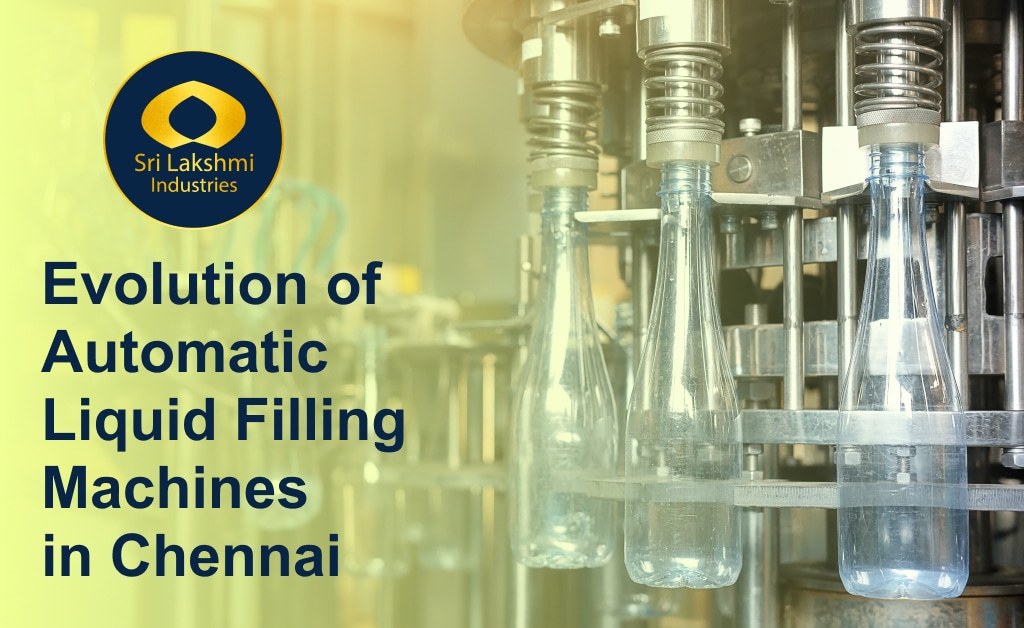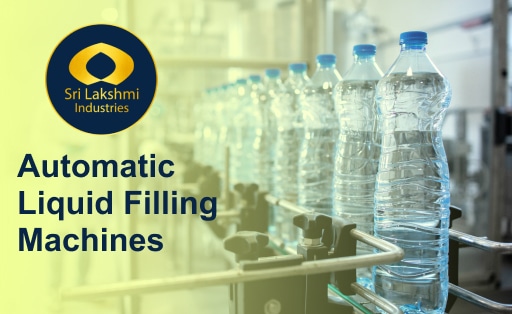
26
Jun 23Evolution of Automatic Liquid Filling Machines in Chennai
- June 26, 2023
- Automatic Liquid Filling Machines Automatic Liquid Filling Machines in Chennai Liquid Filling Machine in Chennai Liquid Filling Machine Manufacturers Semi Automatic Liquid Filling Machines
Introduction
In Chennai’s industrial environment, the field of automated liquid filling machines has seen a remarkable evolution. The industrial sector has undergone a change owing in large part to these gadgets, particularly in liquid packaging. Due to their improved efficiency, precision, and productivity, automatic liquid filling machines are increasingly crucial in a variety of industries, including the pharmaceutical, food and beverage, cosmetics, and chemical sectors. The development of Automatic Liquid Filling Machines in Chennai is examined by Sri Lakshmi Industries, emphasising their significance, developments, and impacts on the industrial sector.
Manual Processes and the Need for Automation
In the first stages of manufacturing, manual filling processes were used frequently. Workers frequently produced waste as they attempted to correctly and regularly pour liquids into containers. These manual procedures were labour-intensive, complicated, and mistake-prone. Since there was a rise in demand for precise and efficient liquid packaging, automation was obviously necessary.
Introduction of Semi-Automatic Filling Machines
The invention of semi-automatic liquid filling devices marked the beginning of the shift from manual to automated procedures. To make the filling process simpler, these machines incorporated fundamental automation elements including pumps, timers, and sensors. Due to their reduced need for human interaction and increased precision, these semi-automatic machines were quickly embraced by Chennai’s manufacturers. However, they lacked the cutting-edge capabilities seen in fully automatic machines and still required manual container placement.
The Rise of Fully Automatic Liquid Filling Machines
In Chennai’s industrial sector, the introduction of completely automatic liquid filling equipment was a crucial turning point. To speed up the filling process, these machines featured cutting-edge technology and sophisticated control systems. The advantages of fully automatic machinery, such as increased speed, precision, uniformity, and less wastage, were immediately realised by manufacturers in Chennai.
Advanced Control Systems: The whole filling process was managed by programmable logic controllers (PLCs) and human-machine interfaces (HMIs) in fully automated liquid filling machines. These technologies enabled producers to specify exact filling specifications, keep track of manufacturing information, and quickly resolve problems.
Accurate Liquid Measurement: To guarantee accurate measurement of liquids, Chennai’s automatic filling equipment included sophisticated flow metres, load cells, or volumetric systems. Consistent fill volumes were ensured by these technologies, which avoided mistakes brought on by changes in viscosity, density, or temperature.
Multiple Filling Modes: The several filling modes offered by fully automated machines were vacuum, pressure, piston, and gravity filling. Greater flexibility and variety were made possible by the ability of manufacturers to select the best mode dependent on the properties of the liquid being filled.
Integration with Packaging Lines: To improve efficiency, automated liquid filling equipment is simply coupled to packing procedures. Together, they could build a whole production line, including capping, labelling, and sealing systems. Integration led to overall productivity growth and the elimination of bottlenecks.
Enhanced Safety Features:With features like automatic shut-off valves, leak detection systems, and integrated cleaning procedures, fully automatic machines put safety first. Throughout the filling process, manufacturers could maintain rigorous quality standards and guarantee product integrity.
Customization and Flexibility
Automatic liquid filling equipment in Chennai was very flexible and customizable. The devices might be modified by the manufacturers to accommodate various container types, sizes, and forms. The machines could also handle a variety of liquid viscosities, from water’s low viscosity to syrups and creams’ high viscosity. The flexibility of industries made it possible for them to meet a variety of consumer demands, increasing their competitiveness in the market.
The Impact on the Manufacturing Industry
The evolution of Automatic Liquid Filling Machines in Chennai has had a profound impact on the manufacturing industry, particularly in the following areas:
1. Increased Efficiency: Automated systems increased productivity while slashing manufacturing time. The interface with packing lines expedited the whole manufacturing process, while precise measurement and uniform filling ensured little product waste.
2. Enhanced Accuracy and Quality Control: Human inaccuracy in manual operations was removed by automatic filling devices. Accurate and reliable fill quantities were made possible by cutting-edge measurement and control systems, which also helped to improve product quality and customer satisfaction.
3. Improved Productivity:Faster fill rates, fewer downtime, and seamless interaction with other manufacturing processes all contributed to manufacturers’ higher efficiency as a result of automation. They were able to increase their output levels and satisfy the expanding market needs as a result.
4. Cost Savings: Although automated filling equipment may need a sizable initial investment, the long-term advantages exceed the expenses. The machines are a wise investment for manufacturers since they reduce labour needs, reduce waste, and increase efficiency over time.
5. Safety and Compliance:Fully automated machinery places a high priority on safety features, guaranteeing that liquid filling procedures meet exacting quality and safety requirements. This is especially important in sectors like medicines and chemicals, where precision and compliance are critical.

Technological Advancements
Continuous technical breakthroughs have influenced the development of automated liquid filling machines in Chennai. To increase these devices’ capabilities and performance, manufacturers have embraced cutting-edge technology.
1. Robotics and Automation: Robotic technologies have been used by manufacturers in Chennai into automatic liquid filling equipment to increase efficiency and accuracy. Robotic arms are capable of handling containers, placing them precisely, and ensuring smooth filling procedures. This degree of automation lowers the need for human involvement, decreases human error, and boosts output.
2. Smart Manufacturing and Industry 4.0: Automatic liquid filling machines in Chennai are now a component of intelligent production processes thanks to Industry 4.0. These devices come with sensors and networking characteristics that make it possible to monitor, gather, and analyse data in real-time. As a consequence of better production efficiency, production optimisation, and predictive maintenance, manufacturers may increase the overall efficacy of their equipment.
3. Internet of Things (IoT) Integration: IoT technology is now included in Chennai’s automatic liquid filling equipment. IoT-capable equipment may exchange information, collect data, and offer insightful feedback with other systems. This connectivity makes it possible for remote monitoring, preventative maintenance, and effective supply chain management, which further improves the machines’ general effectiveness and performance.
4. Artificial Intelligence and Machine Learning: Automatic liquid filling devices may soon incorporate machine learning and artificial intelligence (AI) algorithms, according to manufacturers. In order to ensure precise and effective filling processes, AI-powered systems can analyse complicated data patterns, optimize filling settings, and make real-time modifications. The performance of the machines may be continually improved using ML algorithms, which can also learn and adapt.
Conclusion
The development of automated liquid filling equipment in Chennai has significantly changed the industrial sector. Chennai manufacturers have embraced technology improvements to increase production, precision, and efficiency via the use of semi-automated machines, fully automatic systems, and manual operations. These machines have improved in sophistication and adaptability as a result of the combination of robotics, smart manufacturing, IoT, AI, and ML.
Additionally, industry-specific applications have matched the particular requirements of industries including chemicals, food & beverage, cosmetics, and pharmaceuticals. The development of Automatic Liquid Filling Machines in Chennai will continue, spurring innovation and efficiency in the years to come as Chennai remains a centre of excellence for manufacturing.
